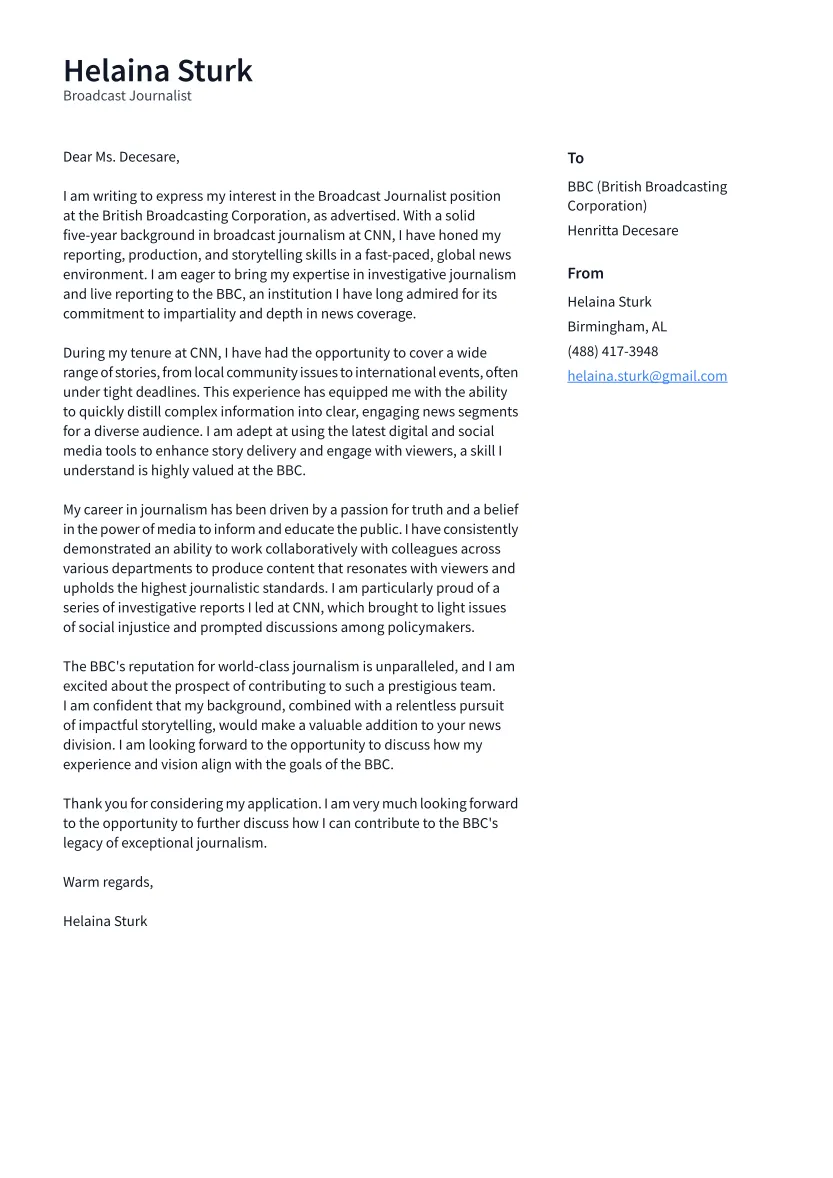Why a Journalist Cover Letter Is Crucial
In the competitive field of journalism, a well-crafted cover letter can be the key to unlocking your dream job. It serves as your initial introduction to a potential employer, giving you the opportunity to make a strong first impression and distinguish yourself from other applicants. Unlike a resume, which simply lists your qualifications, a cover letter allows you to showcase your personality, writing style, and genuine interest in the specific role and media outlet. It provides the context and narrative that brings your experience to life, demonstrating why you are the perfect fit for the position. This is your chance to go beyond the bullet points and tell a compelling story about your career aspirations and why you are excited about this opportunity.
A cover letter is more than just a formality; it’s an essential tool for a journalist. It allows you to express your understanding of the role, demonstrate your research on the company, and highlight how your skills align with their needs. In a world where every applicant likely has impressive credentials, your cover letter is the opportunity to show what sets you apart. By tailoring your letter to each specific job, you can demonstrate your attention to detail and commitment to excellence. Consider it as your first piece of published work for this potential employer and remember, a poorly written cover letter can be an immediate disqualifier, so invest the time and effort to get it right.
Highlighting Your Skills and Experience
Your cover letter should be a showcase of your most relevant skills and experiences. Start by identifying the key requirements listed in the job description. Then, select the experiences and skills that best demonstrate your ability to meet those requirements. This isn’t just a recitation of your resume; it’s about connecting the dots and showing the hiring manager how your past achievements align with their needs. For example, if the job requires strong interviewing skills, provide specific examples of successful interviews you’ve conducted and the impact of those interviews.
Consider structuring your cover letter around the skills and experiences the employer values most. Don’t simply list your skills, but provide concrete examples of how you’ve used those skills in the past. Did you write a compelling investigative piece? Detail the process, the challenges you overcame, and the impact of your work. Did you manage a team? Explain the size of the team, your leadership style, and the results you achieved. By providing tangible examples, you make your cover letter much more impactful and memorable than simply stating you possess certain skills. Quantify your accomplishments whenever possible, using data and statistics to demonstrate your effectiveness.
Showcasing Writing Prowess
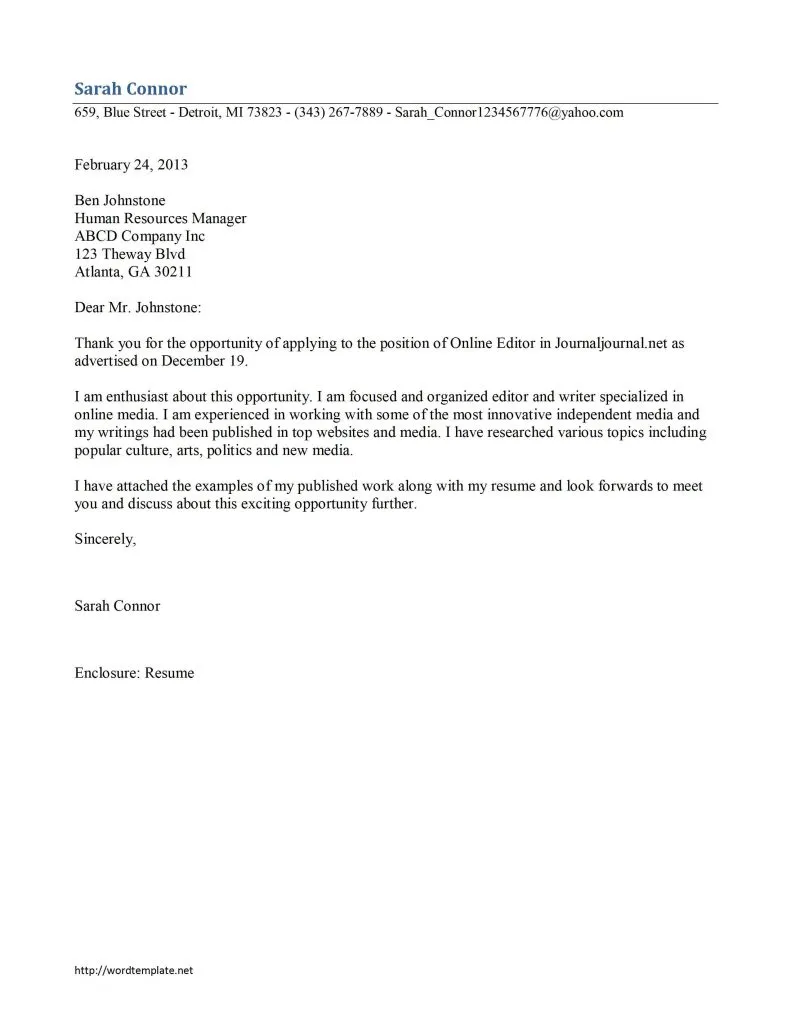
As a journalist, your writing ability is your most important asset. Your cover letter should be a testament to your writing prowess, demonstrating your ability to craft clear, concise, and engaging prose. Pay meticulous attention to grammar, spelling, and punctuation. Sloppy writing is an immediate red flag for any potential employer. Ensure your writing style is appropriate for the media outlet and the specific role you are applying for, whether it is hard news, feature writing, or investigative reporting. Tailor the tone and language to match the publication’s style, showing that you understand its audience and editorial standards.
Beyond simply writing well, the cover letter is an opportunity to demonstrate your storytelling skills. Craft a narrative that captures the reader’s attention from the very beginning. Use vivid language, compelling details, and a clear structure to make your cover letter stand out. Consider using a hook at the beginning to grab the reader’s interest. Avoid clichés and overly formal language. Inject your personality and passion for journalism. Show, don’t just tell, by providing specific examples of your work and its impact. Make your cover letter a compelling read that leaves the hiring manager wanting to learn more.
Crafting a Compelling Opening
The opening paragraph of your cover letter is your first and often only chance to make a positive impression. It needs to immediately grab the reader’s attention and compel them to continue reading. Avoid generic openings like, “I am writing to express my interest…” Instead, try a more engaging approach. You could start with a strong statement about your passion for journalism, mention a specific article you admire, or refer to a particular project related to the role. The key is to show that you understand the media outlet, the role and you are genuinely interested in both.
Consider opening with a brief anecdote that highlights your relevant skills or experience. This could be a story about a particularly challenging assignment you successfully completed or an example of your initiative. If you have a strong portfolio, you could mention a specific piece that showcases your abilities and why it’s a good fit for the role. The goal is to create an immediate connection with the hiring manager, showing them why you’re a strong candidate. Make sure your opening paragraph is concise, focused, and clearly states the position you are applying for.
Grabbing the Reader’s Attention
To truly grab the reader’s attention, go beyond a standard opening. Inject personality and show your enthusiasm for journalism. Highlight a unique skill or experience that sets you apart from other applicants. Mention any awards or recognition you’ve received. Demonstrate that you are not only qualified but also a passionate individual who is eager to contribute to their team. This is not the place to be overly formal. It’s a chance to be human and show that you are truly excited about the opportunity.
Incorporate keywords from the job description to show that you’ve paid attention to the requirements. Tailor your language to align with the publication’s tone. Use a strong call to action. Let the hiring manager know what you would like them to do next, such as reviewing your resume or contacting you for an interview. Remember that your cover letter is not just about what you have done. It is also about demonstrating your ability to write well and show the value you can bring to their team. A well-crafted opening can set the stage for a successful application.
Detailing Relevant Experience
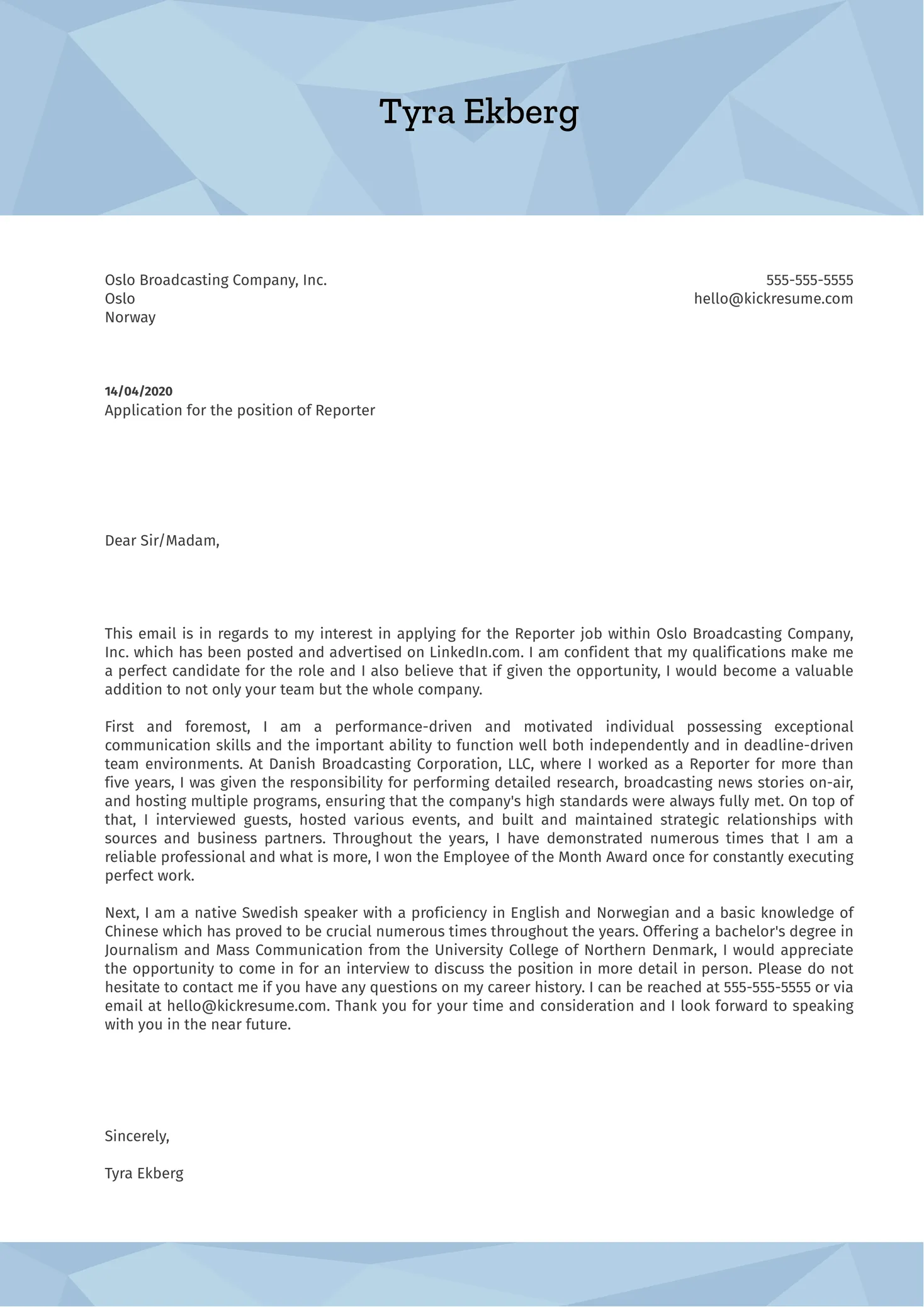
When detailing your relevant experience, focus on the positions and projects most closely related to the job you’re applying for. Provide specific examples of your accomplishments. Avoid simply listing your job duties. Instead, describe the impact of your work and the results you achieved. Use the STAR method (Situation, Task, Action, Result) to structure your descriptions. This framework helps you provide a clear, concise, and compelling narrative of your experience.
Quantify your achievements whenever possible. Instead of saying, “Increased website traffic,” state, “Increased website traffic by 30% in six months through strategic SEO and content marketing.” This data-driven approach demonstrates your effectiveness and provides concrete evidence of your abilities. Highlight any specializations, such as investigative reporting, data journalism, or multimedia storytelling. Mention any relevant software, tools, or technologies you are proficient in. By providing detailed descriptions and concrete examples, you paint a vivid picture of your skills and expertise.
Emphasizing Journalism Skills
Journalism skills are at the heart of what you do, and your cover letter needs to highlight them effectively. Focus on the skills most relevant to the job. These may include writing, interviewing, research, fact-checking, storytelling, and the ability to meet deadlines. Provide specific examples of how you’ve used these skills in your previous roles. If the job requires strong interviewing skills, describe challenging interviews you’ve conducted and the results. For writing skills, share details about a high-impact story you’ve written, highlighting the process and outcome.
Mention any experience you have with different types of media, such as print, online, broadcast, or social media. If you have experience with multimedia storytelling, include examples of video, audio, or interactive content. Show off your knowledge of journalism ethics, and any awards or recognition you have received for your work. Show how your skills align with the needs of the employer. By emphasizing your journalism skills, you show potential employers that you have the capabilities they need to find a great candidate.
Tailoring Your Letter
One of the most important aspects of a successful cover letter is tailoring it to each specific job and media outlet. Generic cover letters are easy to spot, and they often end up in the rejection pile. The more customized your letter is, the more you demonstrate your interest and attention to detail. Research the media outlet thoroughly before you start writing. Understand their mission, values, and target audience. Read recent articles and stories to get a sense of their style and tone. Use the language and keywords that align with their brand.
Address the cover letter to the hiring manager by name. This shows that you have taken the time to research the company and are not just sending out a mass email. Clearly state the position you’re applying for. Highlight specific skills or experiences that align with the job requirements. Explain why you are interested in working for this particular outlet. By demonstrating your understanding of the company and the role, you show the hiring manager that you are a serious candidate. Tailoring your letter also means highlighting the value that you would bring to their team.
Demonstrating Enthusiasm
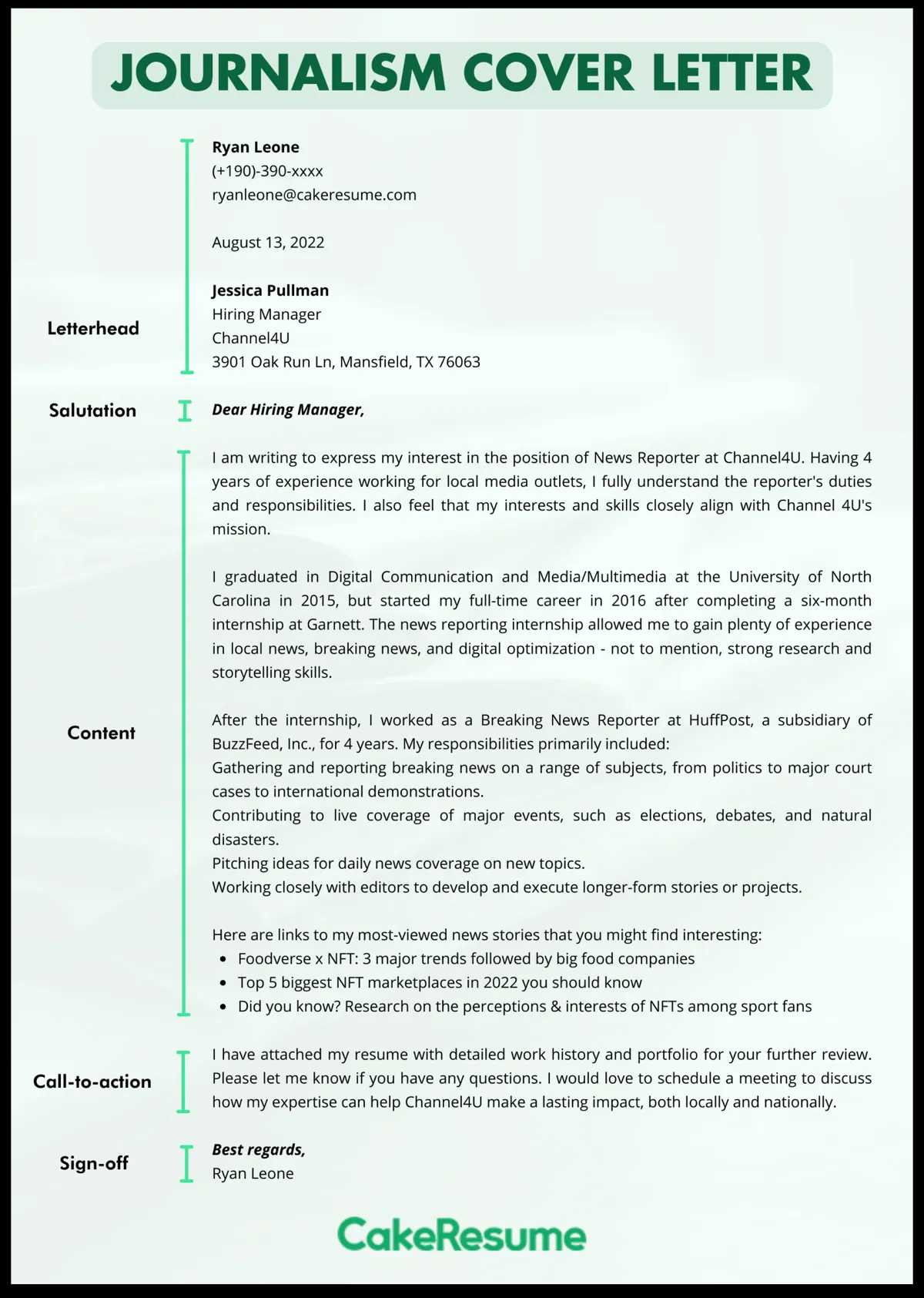
Enthusiasm is contagious, and it can make your cover letter more memorable. Let your passion for journalism shine through. Explain why you are excited about the opportunity and what you are hoping to achieve in the role. Show that you are genuinely interested in working for the media outlet and that you’ve done your research. Use words like “excited,” “passionate,” and “eager” to convey your enthusiasm. Share any personal connections you have to the publication, such as admiring their work, attending their events, or knowing someone who works there.
Demonstrate that you are more than just a qualified candidate; you are a team player who is eager to contribute. Mention how you can bring fresh ideas and perspectives to the table. Show your enthusiasm and explain the role you see yourself playing in the team. Share any personal anecdotes that demonstrate your commitment to excellence and your passion for journalism. Your enthusiasm will not only make your cover letter more engaging, but it will also help you stand out from other candidates.
Proofreading and Polishing
Proofreading is a crucial step that should never be skipped. Before submitting your cover letter, carefully review it for any errors in grammar, spelling, punctuation, and formatting. Consider using spell-check and grammar-check tools. But don’t rely on these tools alone. Read the letter aloud to catch any awkward phrasing or sentence structures. Ask a friend or colleague to proofread it for you. A fresh pair of eyes can often spot errors that you might have missed. Proofreading is the final step in ensuring your cover letter is polished and professional.
Pay attention to the overall appearance of your cover letter. Use a professional font and clear formatting. Ensure the letter is easy to read and visually appealing. Use appropriate spacing and avoid any unnecessary jargon or fluff. A polished cover letter demonstrates your attention to detail and respect for the potential employer. Remember that your cover letter represents you. Take the time to make it perfect.
Understanding the Job Requirements
Thoroughly review the job description before you start writing your cover letter. Identify the key requirements, skills, and qualifications the employer is seeking. Make a list of these key elements. Then, consider how your experiences and skills align with the requirements. Highlight the most relevant information in your cover letter. Don’t just assume that the hiring manager knows what you’re capable of; show them clearly. Address each requirement and explain how you meet it with specific examples. Tailoring your letter to the job description shows that you have paid attention to what the employer is looking for.
Carefully review the preferred qualifications as well. Even if you don’t meet all the requirements, it’s useful to demonstrate how you possess some of the qualities. If there are any gaps in your experience, address them. Explain how your skills or other experiences compensate for those gaps. Show that you are a proactive problem-solver. If you have a strong portfolio, consider including links to relevant samples in your cover letter. Make it easy for the hiring manager to see your work.
Researching the Media Outlet
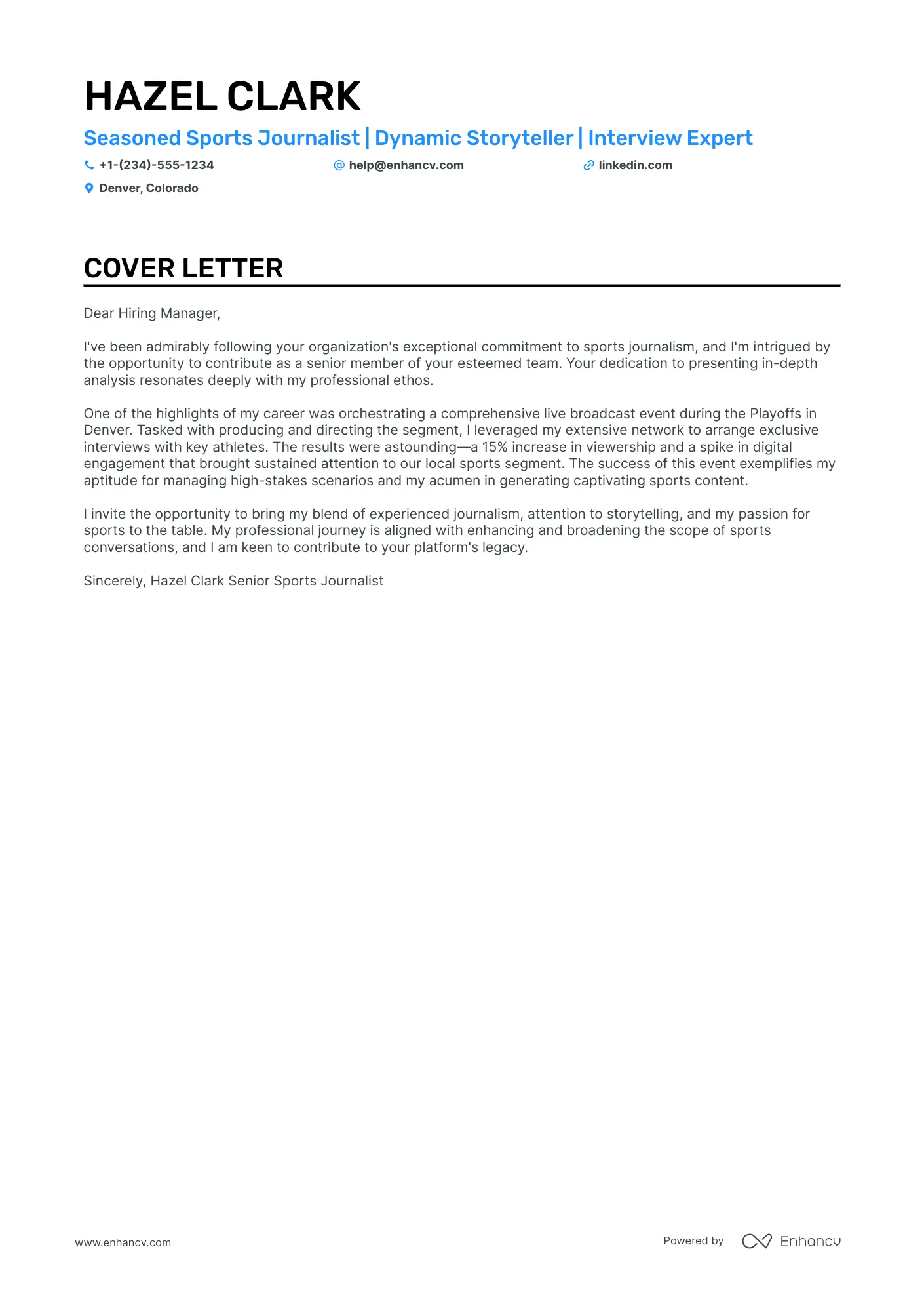
Before writing your cover letter, invest time in researching the media outlet. Read their recent articles, stories, and blog posts. Understand their editorial style, target audience, and the types of stories they publish. Research the company’s mission, values, and any recent news or developments. Find out the names of key people, such as the editor, managing editor, and any staff writers. By understanding the media outlet, you can tailor your cover letter to their specific needs and preferences. Mentioning specific articles or stories that you admire can be a great way to show your interest.
Demonstrate your understanding of the outlet’s brand and audience. Use keywords and language that aligns with their style. Showcase your familiarity with the topics and issues they cover. This level of research also shows your professionalism and that you take the job application seriously. If possible, find out the name of the hiring manager and address the cover letter to them personally. This personal touch can make your cover letter more impactful. Researching the outlet is critical to making a good impression, which is a key step to landing your dream job.
Showcasing Your Unique Value
In a crowded job market, it’s essential to show what makes you unique. Highlight your unique skills, experiences, or perspectives that differentiate you from other candidates. This could be a specialized area of reporting, a particular skillset, or a unique approach to storytelling. Think about what you bring to the table that is different from others. Share your achievements in the past and your goals for the future. If you have experience with data journalism, multimedia storytelling, or social media engagement, be sure to highlight it.
Consider what makes you passionate about journalism. Explain your personal connection to the topics you cover or the issues you are interested in. This helps show that you are more than just a journalist; you’re an advocate. This will help you stand out. It also shows the hiring manager that you are more than just someone that is looking for any job, but a person looking for a job that fits their passion.
Highlighting Accomplishments
Your accomplishments are the tangible evidence of your skills and abilities. Throughout your cover letter, highlight your accomplishments and the impact you’ve made in previous roles. Use the STAR method (Situation, Task, Action, Result) to structure your descriptions. Explain the situation, the task you were assigned, the actions you took, and the results you achieved. Quantify your accomplishments whenever possible. Instead of saying, “Improved social media engagement,” state, “Increased social media engagement by 40% in six months through strategic content creation and audience targeting.”
Highlight any awards or recognition you’ve received. Did you win a journalism award? Were you recognized for your investigative reporting? Include it. Showcasing your accomplishments demonstrates your success and credibility. Make sure you tailor your accomplishments to the requirements of the job. Highlight the accomplishments that are most relevant to the position you’re applying for. Make your cover letter a compelling read that focuses on your successes.
Writing a Strong Closing
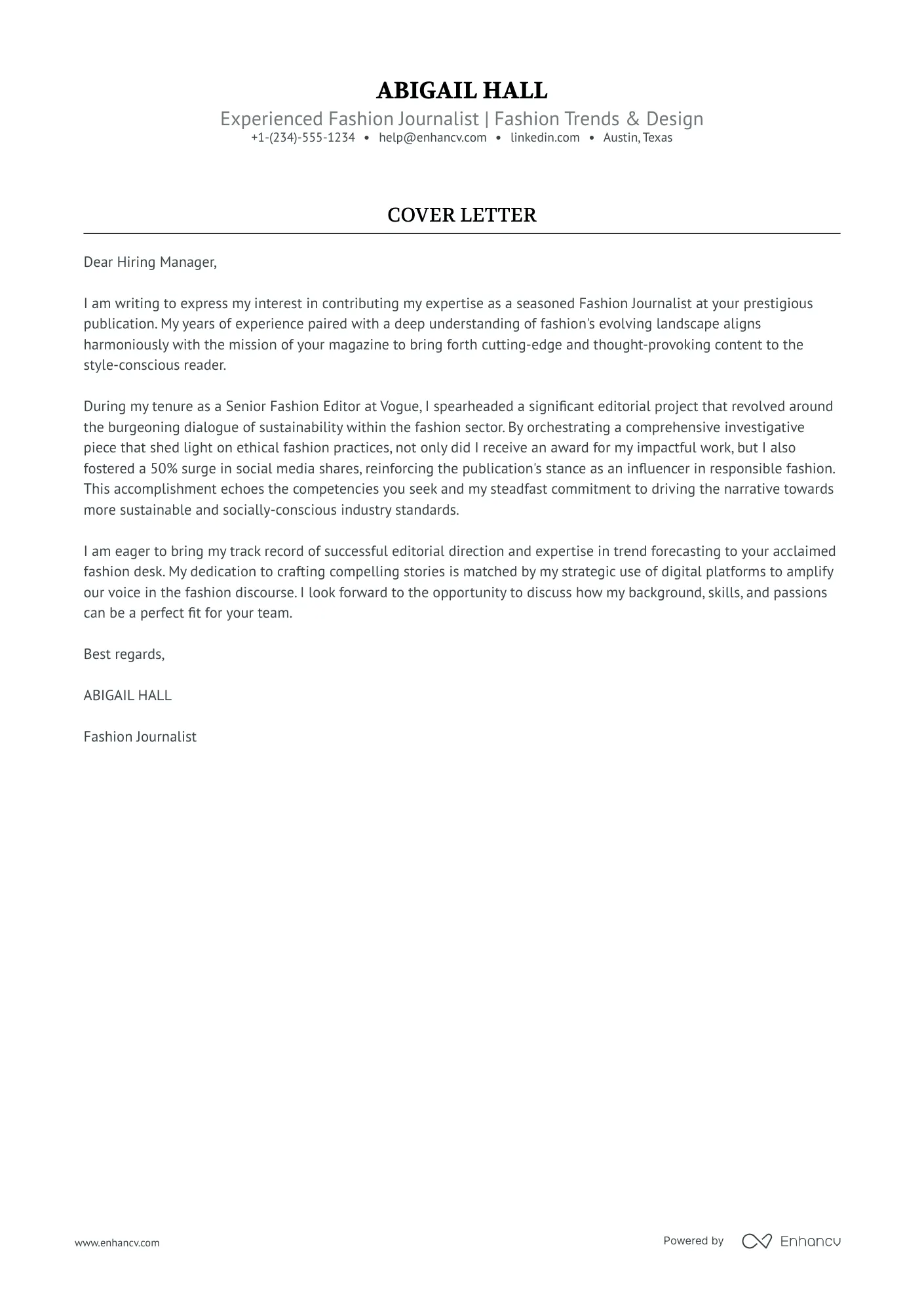
The closing of your cover letter is your final opportunity to make an impression. Keep it concise and professional. Restate your interest in the position and thank the hiring manager for their time and consideration. Include a call to action. Encourage the hiring manager to review your resume and/or portfolio, and invite them to contact you for an interview. Provide your contact information, including your email address and phone number. Use a formal closing, such as “Sincerely” or “Best regards.” Avoid clichés and overly casual language. Proofread the entire cover letter, including the closing, to ensure there are no errors.
Consider ending with a final sentence that reinforces your enthusiasm for the role. You could say, “I am eager to bring my skills and passion for journalism to [Media Outlet Name] and contribute to your team’s success.” A strong closing leaves the hiring manager with a positive impression and encourages them to take the next step, leading to a job offer. Make your closing memorable and leave a lasting impact.
